How bad is a root canal? Root canals are the subject of fear and anxiety for many dental treatment patients. Mention of this term again and again can evoke feelings of discomfort and dread. However, it is necessary to make a separation of fact and fiction and gain an understanding of the process is important to make decisions about dental health.
This article will explore the common questions surrounding root canals, including whether they hurt, the potential pain during the procedure, and whether they are truly bad for you. Let’s delve into the world of root canals and address these pressing concerns.
What Is a Root Canal?
A root canal is a dental process performed to save a damaged or infected tooth. The process involves removing infected pulp from the tooth’s interior, and cleaning and filling it to prevent more infection. Contrary, to popular belief, It is not a painful procedure. In fact, it aims to remove the pain caused by an infected tooth.
Does A Root Canal Hurt During The Procedure?
Thanks to advancements in anesthesia root canals are relatively painless procedures. Before the treatment local anesthesia is administered so patients can experience minimal discomfort. Patients may feel some pain but this pain is far from too much pain. In rare cases, a patient feels high sensitivity but the dentist addresses these issues immediately.
Is Getting a Root Canal Bad Or Dangerous?

Getting a root canal is not bad. In fact, it is an important procedure to save your tooth and prevent it. When a tooth is severely damaged this procedure becomes an important solution to eliminate and stop the spread of the reaction.
Why Are Root Canals Bad?
The negative perception stems from outdated information. Some individuals had unpleasant experiences due to a lack of pain management techniques that led to a misconception that root canals are inherently painful or dangerous. Modern dentistry has made root canals far more comfortable.
How Painful is a Root Canal Without Anesthesia?
Without the anesthesia, the procedure could be quite painful as it accesses the tooth’s inner parts. However, it is important for the dentist not to do such procedures without anesthesia. To make patients pain-free and comfortable during the treatment local anesthesia is a standard practice.
FAQ’s
Are root canals painful after the procedure?
Some patients may experience mild discomfort after the procedure but it is manageable over-the-counter pain-relievers within a few days.
Are there alternatives to a root canal for an infected tooth?
In some cases, a last resort that is extraction might be considered. Saving a natural tooth with a root canal is preferable whenever possible to maintain proper oral function and aesthetics.
How long does a root canal procedure take to complete?
Due to the complexity of the cases, the time duration varies for the procedures. On average, it can take from one to three appointments to complete the treatments.
Is there any special care required after a root canal?
After the procedure, it is essential to maintain good oral hygiene and attend regular dental check-ups. Specific information will be given by the dentist to you to ensure proper healing and long-term dental health.
Conclusion
Despite their negative reputation, this process is important to relieve pain and save natural teeth. With modernization in dentistry and local anesthesia techniques root canals are now relatively less painful. The procedure is not as bad as you have imagined so rest assured if you find yourself needing a root canal.
Trusting a reputable dental clinic like Smile Sky Family Dental will ensure you receive a careful and comfortable experience throughout your root canal treatment. Remember, your dental health is worth the investment in proper care and attention.


